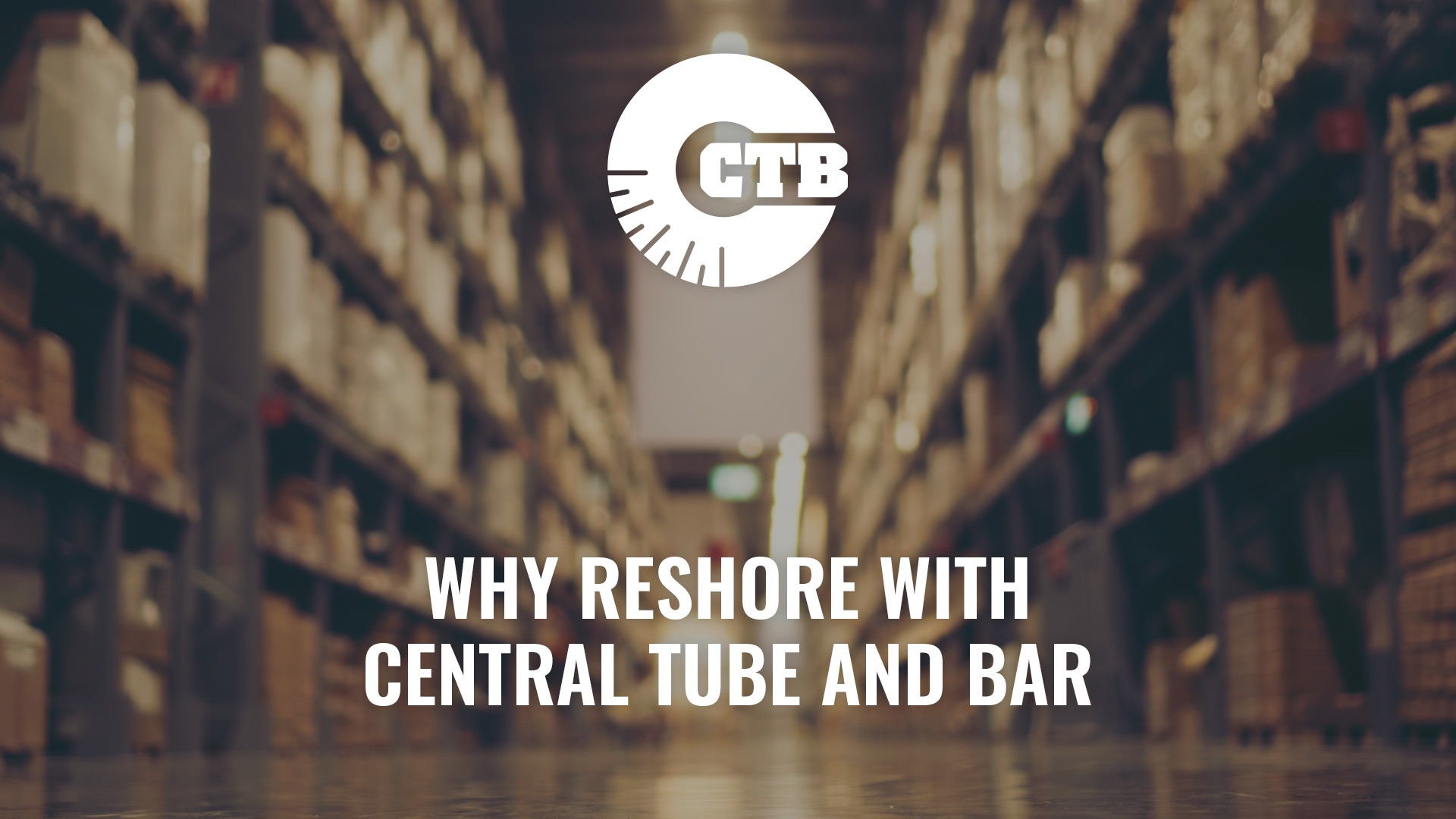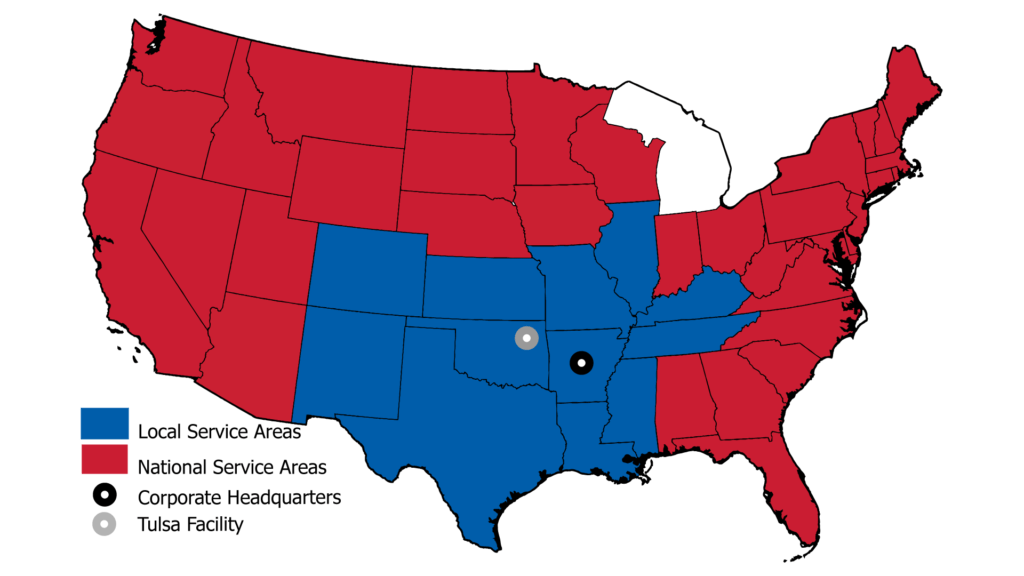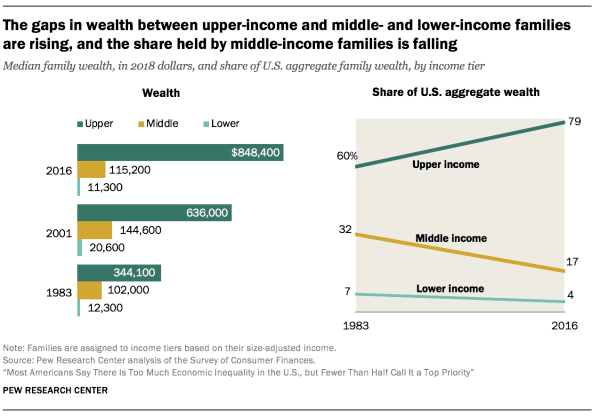64% Of Manufacturers Are Reshoring: Here's Why

Reshoring has a number of advantages for manufacturing companies, from decreasing total costs and supply chain issues to increasing quality and reputation. However, the benefits of reshoring extend far beyond your business.
Bringing manufacturing back to the United States has the power to add millions of jobs to our economy, restore the middle class, and even decrease opioid abuse.
We talk to manufacturers every day who have a preconceived notion that it’s simply cheaper to buy parts overseas. While the sticker price may seem that way, the total cost of offshoring may actually give you sticker shock.
want to learn more about reshoring with central tube and bar?
Contact us today and let's look over your prints to see how we can get you the best parts on time, every time.
The Total Cost OfOffshoring
When you import goods from overseas, you have to factor in all costs associated with it, including:
- Duties
- Customs
- Freight Costs
- Carrying Cost of Inventory
- Quality
- Delivery
- Tarrifs
- And so much more...
The goal of any business is to maximize profits, so it’s no wonder sourcing decisions are often based entirely on price. However, many companies aren’t factoring in all of the costs associated with offshoring.
In fact, most companies miscalculate actual offshoring costs by 20 to 30 percent (Reshoring Initiative).
Unit price simply doesn’t tell the whole story.
Carrying Cost of Inventory
Princeton South Jersey Chapter researchers point out inventory is often the single largest asset a business owns. When you import from overseas, especially China, you’re forced to hold more inventory than you’d like.
The U.S Department of Commerce says importing from China may require a company to hold 100 days of inventory. We find that to be true with many of our manufacturing customers.
CASE STUDY
Mart Cart’s manufacturer was waiting 15 weeks – 105 days – to get key elements of their shopping carts from a Chinese supplier. On top of that, much of the order just wasn’t right.
Carrying 100 days – or more – of inventory can be very expensive, with modest estimates landing at 25% of a product’s unit price.
The carrying cost of inventory includes:
- Storage space, typically warehousing
- Service costs, including insurance, physical handling, and taxes
- Risk costs, such as product damage
- Capital costs, or what that money could be earning if it weren’t tied up in inventory
When you make products nearer to home, you don’t need 100 days of inventory, which drastically reduces your total costs.
GE Aviation reports that since reshoring in 2013, they’ve seen a 36% improvement with inventory and delivery problems (NewburghNY.org).
Central Tube and Bar has locations in the mid-south, and we serve clients across the United States and Mexico.
We help our customers reduce overhead by limiting inventory while still keeping production flowing through pull manufacturing techniques.
Our experienced team coordinates production and supply lead times to offer our customers just-in-time inventory management with same-day delivery from our three locations. That means you’re only receiving parts when you need them. We also use an integrated, electronic Kanban system to keep track of inventory.

QUALITY
The most commonly cited reason for reshoring is quality. Quality standards in America are much higher than other countries.
Take facilities, for example. Here at Central Tube and Bar, all of our facilities are ISO 9001:2015 Quality Certified by independent auditors. That means we meet an international standard dedicated to Quality Management Systems.
QualityInspection.org explains a lot of Chinese companies get ISO certified even though they don’t deserve it.
Perhaps a larger problem is the quality of the actual metals being produced and imported from overseas. We’ve seen it time-and-time again where Chinese steel rusts in less than a month, it cracks when welded, and it’s a safety hazard.
When you use low-quality steel, it has a higher potential of warping, breaking, or collapsing. Depending on what your end product is, this can be a real liability.
At Central Tube and Bar, all of our products are stored indoors, so you’ll never come across rust. We also follow quality and safety standards that aren’t necessarily followed in other countries, including China.
We invest millions every year to ensure we can bring our customers the very best products and processes. That ensures you have a superior quality product that doesn’t put your customers – or your reputation – at risk.
REPUTATION - THE POWER OF "MADE IN USA"
There is power in a “Made in USA” label. That means something to today’s consumer.
Eight in 10 American consumers say they’d rather buy an American-made product than an imported one (Consumer Reports). Many manufacturers realize the reputation of Made in USA products, but pricing continues to be a hurdle.
However, 60% of Americans say they’re willing to pay 10% more for products made in our country (Small Business Trends).
DID YOU KNOW
Manufacturers that source components from Central Tube and Bar have the advantage of a Made in USA reputation.
The American-made reputation is arguably even more important for products made of metal and steel. American quality standards are more intensive than Chinese standards, for example.
Chinese companies aren’t required to go through rigorous testing that ensures steel doesn’t become brittle or susceptible to cracking and warping. Chinese companies have been known to put Boron in their steel to earn a tax rebate, which makes the metal crack easier in addition to being a safety hazard (General Steel).
American-made products have a reputation for a reason – they’re more durable, they’ve gone through more testing, and they last much longer.
If durability isn’t convincing enough, perhaps safety is. In 2013, a metallurgist testified that the Chinese steel used in the Oakland Bar Bridge was poor quality, prone to embrittlement, and leading to potential danger. Thirty-two faulty rods had to be replaced in addition to 750 cracked panels (Independent Institute).
It’s no wonder the fourth most cited reason for companies to reshore is their image and brand – being able to say your products are Made in the USA is, once again, powerful (IndustryWeek).
SUPPLY CHAIN INTERRUPTIONS
When you import from overseas, the logistics can be complex. With a long supply chain, there are more variables impacting your total costs. While there are obvious factors, like tariffs, currency changes, and tax risks, there are also lesser known factors that can interrupt the supply chain.
That includes cost changes in oil and transportation. That includes delays – often up to 100 days – in a world where customers are demanding higher quality products at a faster rate (PLS Logistics). That includes lines being shut down due to a variety of reasons, including safety hazards, pollution crackdowns, and most recently, a worldwide pandemic.
Chinese manufacturers prepare to reopen in the wake of the coronavirus, but it’s not as simple as going back to “normal.” In order for products to make it to the U.S., the following needs to happen:
- The proper number of employees need to return to work
- Factories need enough raw materials to start production again
- PPE is needed to ensure worker safety
- Truckers and ports need to be in working order
When goods are made in the U.S., the supply chain is leaner and shorter with more transportation options. While the U.S. is also delayed after the coronavirus, manufacturing facilities have the advantage of being closer and with more transportation flexibility, which minimizes the effects of being shut down.
If you can shorten your supply chain, you decrease the chances of something going wrong.
Here at CTB, we’re proud to say in over 20 years:
- We’ve never shut a customer line down
- We’ve never let a customer run out of product
- We still have our first customer from over 22 years ago
Our dedication to our customers and a shorter supply chain makes this possible.
With three locations and 7 tube lasers, CTB is able to seamlessly stay up and running to meet customer deadlines when unexpected downtime occurs. You can rest assured that your parts will arrive on time, something you can’t always be sure of when offshoring.
UNCERTAINTY
The political climate has often caused companies to rethink where they source materials – whether it’s the ongoing trade disputes, tariffs, or the coronavirus, there are always lingering tensions that could impact your supply chain.
According to IndustryWeek, 57% of companies that have reshored said they did so because of anticipated and actual Trump tariffs.
Beyond tariffs and the political climate, we have the uncertainty of natural disasters. When there’s so much physical distance between your supplier and your destination, there’s more possibility for a natural disaster to come into play.
From earthquakes to nuclear disasters to flooding, the uncertainty of a natural disaster can wreck your manufacturing plans and shut down facilities needed to continue your operations.
When you work with CTB, you only have to contend with potential natural disasters here in the U.S., and only within a certain radius of our facilities. When you import, you have to contend with natural disasters across the globe.
LEAD TIME
When you reshore, your time to market is much faster – often months faster.
If you need third party suppliers to get your end product to market, it’s critical you receive the parts and materials needed in a timely fashion. You also might need the ability to make changes quickly, because parts arriving early can be just as bad as parts arriving late if you have no room to store them.
Here at CTB, our production runs are timed around yours, so your parts are shipped when you need them – not too soon, and certainly not months too late.
When ordering parts and materials from China, you don’t have the advantage of going to market quickly. You can’t respond to a trend or beat competition to the punch, because you’re always lagging months behind.
CTB has the storage space to stock and release parts as the customer requires. This allows for the customer to place an order and have parts ship in as little as one day. There’s a huge difference between waiting 30-40 days for ocean freight from China and just days when you order from CTB (FreightOS).
Another way to speed up lead time is to reduce the number of vendors involved in your manufacturing process. CTB is able to provide turnkey components, so customers have one main point of contact with one vendor instead of multiple vendors. This frees up the customer from having to coordinate and track their parts from vendor to vendor.
We’re proud to help our customers speed up their lead time so that everything runs smoothly and you can respond to new opportunities quickly.
Indirect Impacts OfReshoring
The effects of reshoring go far beyond your business – they can change the very infrastructure of our country. Reshoring offers:
- Supports American Jobs
- Restores The Middle Class
- Reduces Drug Abuse
- Decreases Global Pollution
The indirect impacts of reshoring are certainly something you can feel great about. At the end of the day, parts are parts. Some fabricated parts are better than others (as we’ve covered above), but it’s people that drive businesses.
Central Tube And Bar is proud to partner with OEMs and Fabricators to support the American economy and workforce.
ADD AMERICAN JOBS
There are two ways we can offer more manufacturing jobs in the United States:
- Import less (reshore)
- Export more
Reshoring is the far easier option, and we’ve already started to see the massive impact reshoring can have on the U.S. economy.
In 2018, 1,389 companies reported new reshoring efforts, which contributed to 145,000 jobs in the U.S. (Reshoring Initiative).
While many companies are exploring reshoring options, certain segments of manufacturing are suffering.
DID YOU KNOW
Cheap Chinese aluminum has flooded U.S. markets. Since 2001, the number of aluminum smelters in the U.S. has fallen from 23 to just five (Foreign Policy). Here at Central Tube and Bar, we’re proud to provide aluminum sourced right here in the USA.
And it’s not just about the loss of American jobs – it’s also a threat to our national security. Aluminum is used to make planes for national defense and war. Many worry the United States doesn’t have the capacity to produce enough high purity aluminum to meet needs in a national emergency.
As a business owner, it’s a wonderful feeling knowing you’re providing jobs to those in your community while also ensuring we have the supplies we need to take care of our country.
Restore The Middle Class
Manufacturing jobs are the heart and soul of the middle class. Unfortunately, the industrial heartland states of Pennsylvania, Ohio, Michigan, Indiana, Wisconsin, and Illinois lost 36% of manufacturing jobs from 2000 to 2010, a total loss of 1.8 million jobs (U.S. Bureau of Labor Statistics).
If we can hold on to existing jobs and begin reshoring efforts, there’s a possibility to shift the economic landscape of the United States.
The current wealth gap in our country has grown significantly wider in the past 20 years.

Restoring the middle class results in reduced income inequality, and believe it or not, manufacturers have a tremendous amount of power to make that happen.
Reduce Drug Abuse
When hundreds of thousands of Americans started losing their manufacturing jobs, a shocking 50% of them are reported to be involved in the opioid epidemic (IndustryWeek).
A sense of despair, stress, and loss all contribute to substance abuse, and the working-class is often most susceptible to fear – fear that they won’t be able to find another job as U.S. working-class positions are lost due to offshoring.
An alarming new study found that when factories close, deaths from opioid overdoses rise (U.S. News). The study showed white men between the ages of 18-34 are affected the most.
At CTB, we’re proud to offer high-quality manufacturing jobs, providing opportunity to the men and women in our communities.
Reduce Global pollution
Long supply chains mean more opportunity to contribute to the global pollution problem. The shipping industry uses fuel containing sulfur, and while the International Maritime Organization is trying to reduce emissions, it’s still a problem that could be helped by increased reshoring efforts.
Beyond the fuel needed to get products from China to the U.S., we can’t dismiss the emissions used in the production process.
In China, carbon emissions are two times greater than they are in America for the same amount of steel. Why? It’s cheaper. In America, steelmakers spend 80% more per ton of steel to help reduce the pollution levels to both air and water (General Steel).
By reshoring, you’re not only shortening the supply chain, which reduces emissions, but you’re supporting American suppliers who are investing significantly more to ensure our world is a cleaner place for future generations.
All Things Considered, The Choice Is Clear
Reshoring might make more sense for your business than you previously realized. If you’re currently sourcing from China, it’s worth taking a hard look at the total cost of offshoring.
Many variables come into play, including the carrying cost of inventory, quality and warranty issues, the reputation of buying from China, supply chain interruptions, uncertainty – both political and otherwise, and lead time.
When manufacturers consider all of these elements, they find they’ve miscalculated actual offshoring costs by 20 to 30 percent (Reshoring Initiative).
When you take initiative to reshore with CTB, you not only benefit from just-in-time inventory management, but you enjoy high quality, the “Made in USA” reputation, a leaner supply chain, and even same-day delivery.
You can also be extremely proud that you’re adding back American jobs, helping restore the shrinking middle class, reducing drug abuse, and reducing global pollution.
Improve your manufacturing process today
Discover how Central Tube and Bar can improve your manufacturing process with a no-obligation quote. Simply fill out the form below and a CTB team member will be in touch right away.
